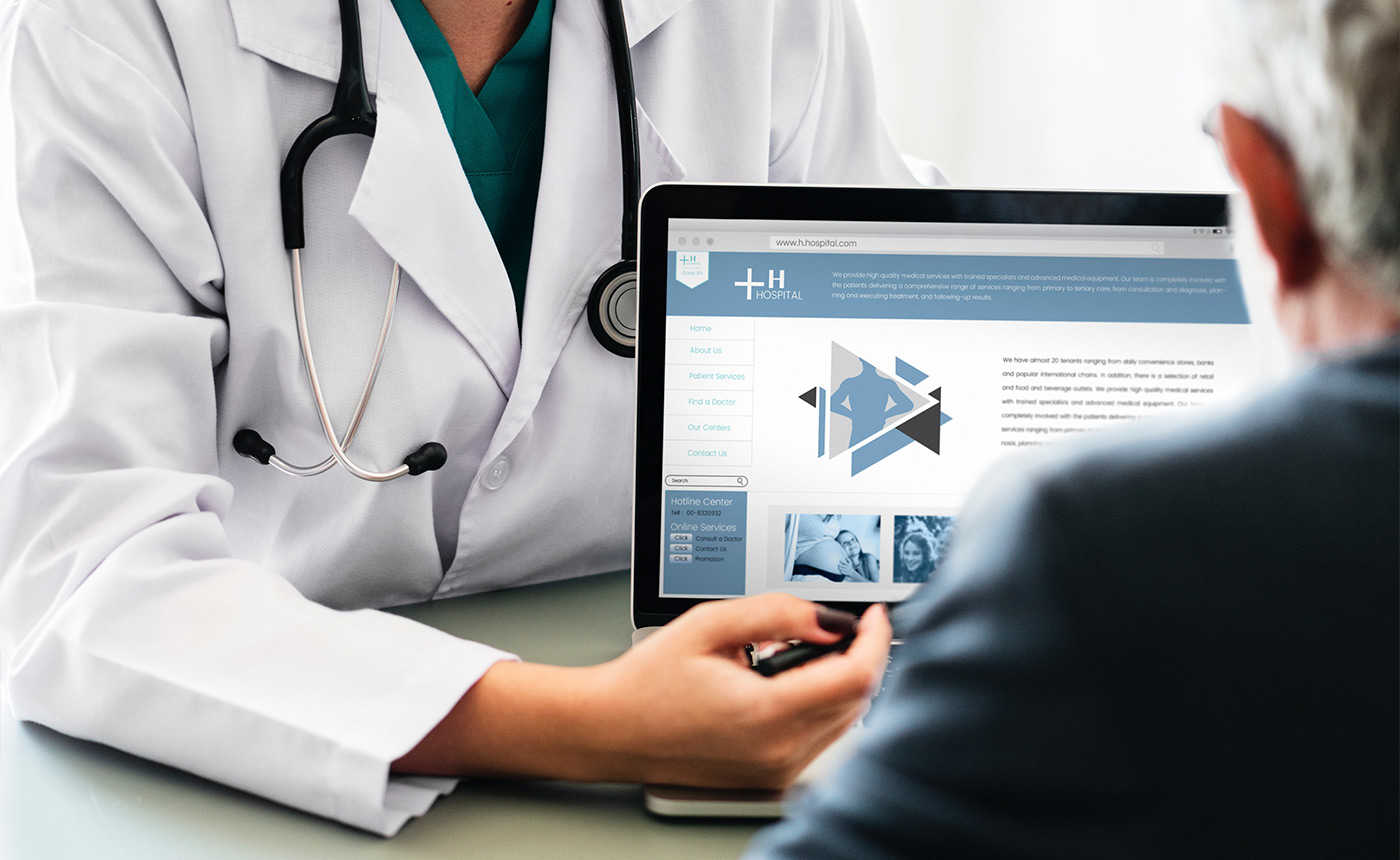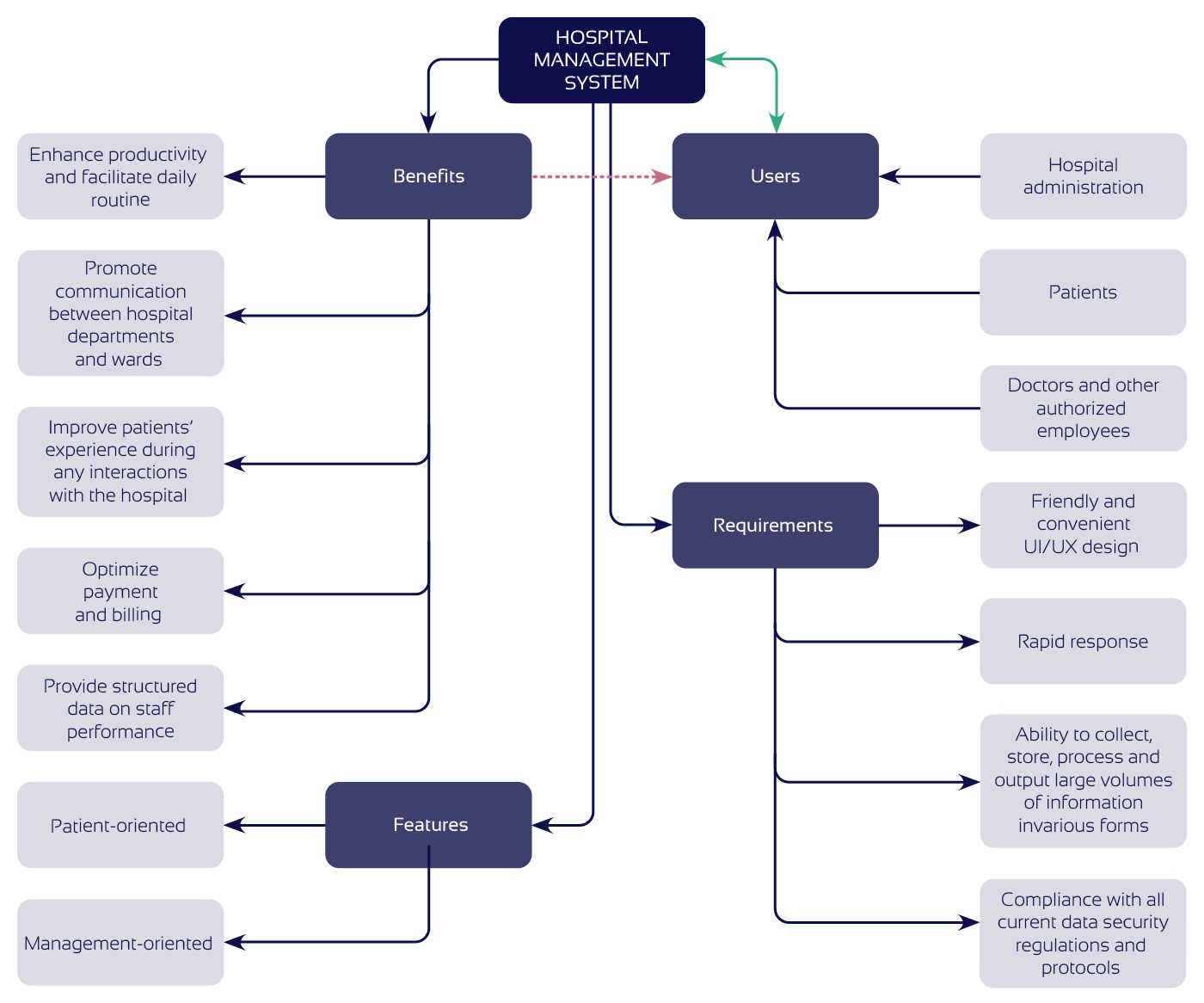Do you have a hospital management system project on your mind and are looking for a guide on how to develop a bespoke solution? Good news, you’ve found it! This article will inform you about the main features of the hospital management software (HMS), its goals, requirements, and users. You will also learn about the challenges commonly faced by healthcare business owners willing to invest in such software, as well as technical problems, relevant solutions, and 7 vital steps of hospital management software implementation.
Defining the Target Audience of Hospital Management Systems
In order to create a robust and efficient system that will be loved by the end users, will improve the quality of medical services, and will help to handle patient flow better, developers must fully comprehend its future functions, target audience, and supposed benefits. Only after retrieving all this information they will be able to plan and coordinate their efforts, choose the most appropriate technologies, anticipate potential problems, and build a hospital management system that will solve the client’s business problems and make the workflow of a healthcare facility more structured and streamlіned. A hospital information management system, as its name suggests, is a complex software suite of interconnected program modules that serve to offer information and management capabilities to a large variety of users.
The users of a hospital management system may be generally divided into three categories:
- Hospital administration
- Doctors and other authorized employees
- Patients.
To safeguard the utmost data security and prevent potentially sensitive information breaches, each category of users should have a separate set of rules for clearance/restrictions within the hospital management software. This set depends on a user’s role and varies from unrestricted access granted to the highest administration members to limited access to a certain portion of information for patients. For example, a doctor should have access to his patients’ medical data but should not be allowed to get information on other doctors’ patients without permission. The patient, on the other hand, should have full control over their own electronic medical records and other personal data but should not be able to review or modify any other kind of info a facility’s hospital management system may contain.
Every user should have a unique identifier, which associates the person with that person’s rank in the system. Users with higher ranks and more permissions within hospital management systems may be required to go through additional means of authorization. Such authorization means may include, among others, a fingerprint or a face scan, a keycard, a USB dongle, or voice authorization.
Strict access rights management helps to make a hospital management system project more fail-safe, maintain an audit trail, and keep the software compliant, as it is one of the main requirements for ensuring the top level of security for medical records and other sensitive patient data.
Key Features of a Hospital Management System
A healthcare business owner or any other person interested in building a hospital management system should remember that this type of software is required to provide a diverse array of highly specific features and functions, some of which are not used in other industries.
Management-oriented features:
- Doctor timetables and scheduled appointments. Allows doctors to plan and browse their timetables. Also allows sharing such information with patients in order to make an appointment.
- Pharmacy monitoring, management, and information module. Provides data regarding drugs and supplies currently in stock and allows ordering them in advance.
- Operation room availability schedule and management.
- Food management for patients’ diets and hospital cafeteria.
- Ward management. Provides various types of planning, tracking, and performance reports separately for every single ward.
- Supplies inventory monitoring and purchase management. Deals with any consumables that do not belong to the pharmacy. Also includes fuel tracking for ambulances.
- Utilities expenditures, water, electricity consumption.
- Laundry management
- All the other kinds of inventory management.
As you can see, this group of features within a hospital management system will be of great use to the hospital administration, as it helps to optimize work, coordinate current resources and staff, vicariously enhance the quality of patient care, and increase profits.
Patient-oriented functions:
- Patient registration. Allows registering a patient who comes to the clinic in order to obtain a Personal Health Record provided by this person or his family member. This is universally done by filling out a template form.
- Patient admittance information. This feature collects and maintains an Electronic Medical Record after the person is admitted to the hospital. This module also communicates with other medical databases in order to retrieve and update a patient’s complete Electronic Health Record.
- Patient billing, insurance, and credit tracking.
- Emergency care module. Allows speeding up the process of registration and admission during pre-hospital treatment, such as in emergency rooms.
- Patient notification. Notifies patients about their appointments, medication times, discharge recommendations, etc. This function may be provided by a separate web or mobile application that is linked to the hospital management system. The reminder functionality may also be provided using existing messenger apps.
- Pharmacy information, booking, and purchase for patients. Allows a patient to buy a particular drug immediately or order it in advance.
This list of exemplary features is far from complete. Depending on the facility’s specifics, size, and location, it may change drastically. Moreover, each of the features of hospital management system is aimed to resolve a specific pain point or a business issue, so the total number of functions will be different for each entity.
With that being said, even such a short list of hospital management system features will help one understand where to begin when developing a quality management system in a hospital.

Five Primary Requirements for a Hospital Management System Project
You may notice that hospital management is a complex process, and for that reason, there are numerous requirements for a management system in a hospital:
1. A friendly and convenient UI/UX design is one of the key features of hospital management system, considering the large number of potential users. Both medical staff and patients need an informative and convenient digital system that will be both easy to use and efficient regardless of the user’s age and computer skills.
2. An ability to collect, store, process, and output large volumes of information in various forms. The hospital management software is required to enable automation in order to handle an enormous amount of text data that encompasses different types of hospital documents: from patients’ medical histories and insurance to clinical trial documents and complaints. In addition, the hospital management system must be compatible with various types of media information: video and medical images, such as recorded operations, results of computed tomography, and 2D or 3D MRI scans.
3. Compliance with all current data security regulations and protocols in order to protect patient data confidentiality and prevent unauthorized access to the system. Ensuring electronic medical records and other sensitive data safety is another top priority, as hospital documents and other types of information healthcare facilities typically operate are highly confidential. Any leak of information, as well as data loss or corruption, may lead to potentially devastating outcomes, including lawsuits and other financial repercussions, in addition to ruined reputation, all of which may force the hospital to close.
4. Rapid response time and high data processing speed is a necessity for hospital management software, because often time is of the essence in medicine. All hospital management systems should allow fast registration of new patients in case of emergency, as well as rapid retrieval of relevant patient data, such as complete medical history, from the system archive or other hospitals’ databases.
5. Interoperability is also one of the requirements for hospital management system. Technically, the hospital management software doesn’t have to be able to freely exchange information with digital systems in other healthcare facilities, but if it has such an ability, it’s a win-win situation. Interoperability significantly boosts the quality of patient care, increases operational efficiency, and simplifies the workflow of the medical staff.
Specified functions and hospital management system software requirements determine the choice of tools and technologies used to develop a hospital management system. Only experienced specialists can pick proper techniques that are able to provide solid functionality, high speed, and positive user experience. If you have doubts, Python and MySQL are a good universal choice to begin with.
Our team has successfully completed several similar projects, as well as implemented plenty of other types of custom healthcare software, so feel free to browse our case studies and see what technologies we used. Also note that Light IT Global has many HIPAA and GDPR-compliant projects under its belt, so by partnering with us, you can be sure that your hospital database management system or any other software will be secure and transparent enough to meet all of the compliance requirements.
What Benefits You Can Expect From a Hospital Management Software Solution?
Since the software development process is based on the customer’s needs, the developers should fully understand the aims and expectations of the client. To achieve this, a reliable software development services provider will include a BA in the process. An experienced business analyst will help a customer better understand which hospital management software features to include in the project and how to derive maximum benefit from custom hospital management software development.
And while the goal of hospital management system implementation will be different for each client, a well-designed hospital management system offers many advantages by default. The most prominent of them we will list below.
Enhance productivity and facilitate daily routine. Hospital management software should simplify the day-to-day activity of users, allowing them to fulfill their tasks faster and avoid mundane work that can be fully automated. As a result, work efficiency is greatly increased, with a significant reduction of possible errors caused by a human factor. For instance, hospital management system should provide an automated solution for quick updates of patients’ histories to add or remove symptoms, alter a list of medications based on a patient’s condition, etc.
While the hospital management system automates the workflow it also helps to reduce downtime and queues for medical equipment and operation rooms. For example, every time a patient cancels his or her appointment, the relevant doctor’s schedule is updated and changes are marked in a real-time mode.
Facilitate communication between hospital departments and wards. A hospital is a complex mechanism that needs precise coordination and quick response from all its constituents in order to provide its services effectively. A well-executed hospital management system should allow obtaining relevant data in a digital or print form and in a fast, reliable, and secure way. Exemplary types of data include analysis results, digital medical records, operation room schedules, pharmacy inventory, and others.
Improve patients’ experience during any interactions with the hospital. A reliable and convenient modern hospital management system will boost patients’ trust in medical services, thus attracting more clients and enhancing the reputation of the facility. In addition, a properly designed system should notify patients about relevant healthcare services and procedures like their doctor appointments or daily medication schedules, for example.
Optimize payment and billing. A hospital is a business company that includes all corresponding financial interactions between a service provider, executives, customers, suppliers, insurance companies, etc. The hospital management system should allow different types of payment for medical services and products, which will be a huge help for all financial transactions and will provide more freedom to patients increasing brand loyalty.
Provide structured data on staff performance. A management system brings an additional business advantage by tracking performance of hospital personnel and providing comprehensive reports to the administration. Hospital administration may use these detailed reports generated by hospital management system software to identify what types of hospital services bring more revenue and what unprofitable departments should have reduced funding or should be closed temporarily or permanently. It also helps to identify and resolve potential problems before they escalate and get out of control, thus, preventing damage to both finances and reputation.

Key Steps of an Online Hospital Management System Development
Now that you know about the purpose of management system development and the main advantages of hospital management system, let’s map out several essential steps one must follow to receive a fully-functioning innovative software that will meet all of their business needs perfectly.
1. Conduct market investigation
Prior to starting a long-lasting and resource-consuming management system development project, take some time to conduct a comprehensive market investigation. Research to find out which hospital management systems are in demand, what features medical professionals and patients want to see in such software, what challenges typically appear during the development process, what is the average cost of implementation for custom healthcare management systems, etc.
During this stage, you should also define your healthcare industry competitors and find out what kind of hospital management systems they are using. Check if their staff and patients are happy with what they’ve been given and draw inspiration for your project from the collected information. For example, if you know that the hospital management system of one of your competitors lacks some kind of feature and the patients are complaining about it, be sure to include said feature in your software.
2. Define possible challenges and bottlenecks
As we’ve mentioned before, building a market-ready hospital management system that will help your team take care of multiple tasks at once (think patient management, task automation, medical records and inventory management, laboratory management) is time-consuming and requires profound healthcare industry expertise. Ergo, it may be a good idea to make a list of potential challenges that should be addressed by the tech team you’re about to hire.
Some of the examples of such challenges include the following:
- Achieving compliance with all the healthcare industry regulations relevant to your country or region.
- Seamless hospital management system integration with the existing software you use in your facility.
- Building adequate UI/UX and conducting comprehensive usability testing.
- Ensuring the solution’s scalability to prevent issues with system overload in the future.
3. Create a list of desired hospital management system modules and features
This step is not so much about visualizing the benefits of hospital management system you aspire to obtain rather than about figuring out the timeline and the budget you should accumulate prior to diving into the development stage.
Feel free to include all the functionality you think may be useful to your workers and your patients, think about all the digital tools that may make your team’s life easier, boost their productivity, and enhance the quality of patient care. Make the list as long as you want it to be. The features of a hospital management system can be prioritized by your vendor, and low-priority ones can brought to life later.
If you’re not sure which modules to include at all, feel free to use information from this article or draw inspiration from digital products offered by the most successful healthcare providers and your competitors.
Mandatory functionality includes (but is not limited to):
- Patient management (including medical records)
- Inventory management
- Appointment scheduling
- Billing and claims processing
- Laboratory and pharmacy management
- User profiles
- Analytics and reports
- Insurance services integration
- Security measures to keep patient data and other sensitive information protected
4. Choose the vendor
Once you have an idea of what your future hospital management system will be, proceed to one of the most important steps of them all — IT vendor selection.
If you’re one of the healthcare providers that have their own tech team skip this section. But if you haven’t yet assembled your own in-house IT department, read this passage carefully.
Start by sorting out your priorities. Is your budget tight? Is working with an IT provider from your country a must for you? Would you like to forge strong working relations that go beyond one IT project? Do you have a specific deadline? Figure out the list of requirements you have and form a portrait of your ideal IT vendor.
Do not limit yourself to tech teams from one specific country (unless it's your preference). Outsourcing can be a great way to cut costs and still develop a modern hospital management solution within a pre-agreed term.
Choose 5-10 vendors that meet all of your requirements and ask for a consultation or a project estimation. A trustworthy IT company will be ready to provide you with a free ballpark estimation, answer any questions, and even offer suggestions regarding your idea. Take your time evaluating the contestants, comparing rate cards, and assessing the communication quality and your first impression.
Always ask a potential IT vendor if they have experience developing compliant healthcare software and if they have worked with notable healthcare providers before. An extensive portfolio is also a must at this point as well as customer reviews.
Double-check everything before committing to a partnership because the development process will most likely be lengthy and poor choice at stage may turn into significant financial losses later.
5. Launch an MVP
An MVP (or a minimum viable product) is the “backbone” of any hospital management software. It contains only those features that are necessary for the system to function properly. Once the MVP is released, the development may continue, and additional modules may be added.
However, it is not recommended to release a hospital database management system when it is fully equipped with all the functionality the customer wants to see. An MVP helps to find out about the genuine audience’s perception and the possible flaws of the software as early as possible. Consequently, these hypothetical changes are easier and cheaper to make. For example, as a business owner, you may find out that users don’t find your app to be intuitive enough or that there’s a need for additional functionality that will help a hospital management system process information faster. When all you have is an MVP, such requests are relatively easy to fulfill.
6. Gather feedback and release a market-ready hospital management system
Upon launching an MVP be ready to collect the audience’s feedback. If you receive many not-so-positive reviews about your existing hospital information management system, don’t be discouraged. You have time and resources to make the necessary changes and turn your digital solution into something users will love. It may be wise to go through several rounds of improvements and feedback collection just to make sure the target audience is 100% satisfied. Right after that, you can launch a fully-fledged hospital management system and reap the benefits of your careful and systematical development approach.
7. Don’t forget about the maintenance
It is vital for healthcare providers to keep their hospital and patient management software functional and up-to-date at all times. As your business grows you may require to scale the system accordingly or add new features to further improve the quality of patient care and healthcare services. To achieve that, stay in touch with your IT vendor or form an in-house tech team that will take care of the ongoing tasks like updates, bug fixing, upscaling, and others. Typically the cost of a reasonable maintenance package is pretty affordable and it’s definitely worth it to give your personnel some peace of mind and get immediate assistance in case of emergency.
To sum things up...
As you can see from this article, thorough development of a hospital management system is a complicated task that requires a lot of skill and resources. If you need such medical info solutions, better leave this job to professional and experienced developers specializing in such cases. Light IT Global is ready to create an effective, fast, and reliable hospital management system, customized for your specific needs. Our experts will ensure top security for your patient medical records and financial information, will adhere to all compliance requirements, will keep the system flexible and scalable, and will also provide comprehensive quality assurance to make the software flawless. Contact us today and turn your vision of a hospital management system into a real and highly efficient application that both your team and your patients will love.




